At NGS’ Science Social Café, MCBees Women Serve as Role Models, Exemplify Careers in Science
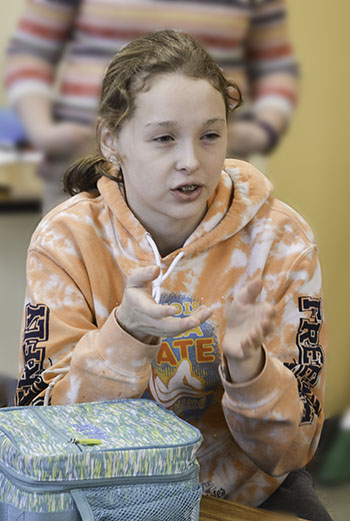
An NGS student interacts with the MCB students during the March 9th NGS Science Social Café.
March 19, 2018
On Thursday March 8th, six MCB PhD students briefly put the work in their labs on hold to drop by the Science Social Café at Next Generation School’s STEAM Studio in Champaign. There, while a group of 11 middle school girls ate their lunches, they served as role models, explained a bit about how they ended up in science, shared what doing research as an MCB graduate student at Illinois is like, and described their career goals and other possible careers in their field. Plus, they were available to answer any of the younger students’ questions. The goal of the event? According to STEAM Studio Director Angela Nelson, it was to “break the boundary of ‘You could be a doctor, an engineer, or a lawyer,’” and open the youngsters up to the myriads of possible careers, such as in science and research.
The six, all PhD students in Illinois’ School of Molecular and Cellular Biology (MCB), are all also members of the MCBees GSA (Graduate Student Association). Passionate about their fields and about research, these women are also passionate about sharing their love of science with students younger than they; in fact, most have been actively participating in many outreach activities, including those organized by the MCBees’. So they all made time in their busy schedules for this particular outreach; however, their primary motivations varied.
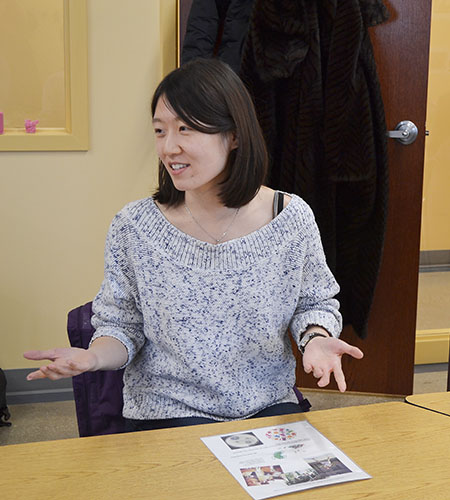
MCB PhD student Andie Liu shares her story with the NGS students.
Most acknowledged that they came to the Café to serve as role models for the girls. For example, MCB PhD student Andie Liu says that when she was little, her aunt, who is a scientist, was her role model. So her goal in participating in the Café was to possibly be a role model for some of these girls.
“I came today because when I was young, I was hoping that I’d have the chance to interact with a more senior female scientist. I hope this is a good chance to tell the girls here my story.”
Liu studies small molecules produced by bacteria to fight each other, which she indicates are often times antibiotics, and sometimes antifungal. “It’s a nice reservoir for people to find new drugs,” she reports.
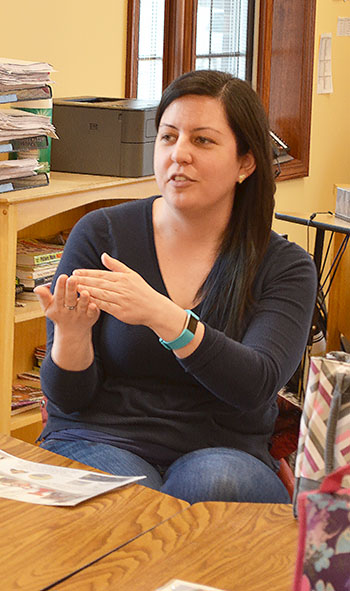
Jessica Kelliher shares with the group about her career goals.
Jessica Kelliher, another Ph.D student in MCB, states that she came to the event in order to share about her journey:
“About how I’ve been interested in science and following my passion for science since grade school.”
Plus, she admits that she hoped to “inspire young girls do the same on this international women’s day.”
Kelliher, who studies how Staphylococcus Aureus survives in the human body, more specifically studies how staph competes with the human host for nutrients like iron and zinc.
Along with being role models for the girls, the ladies also came to share with the middle schoolers the idea that there are lots of different, exciting career possibilities in science.
For example, Katie Frye was another MCB PhD student who, growing up, had no idea that she could choose a career in science.
She confesses, “I liked science all along, but I didn’t think it was a career. I didn’t know that graduate school even existed.”
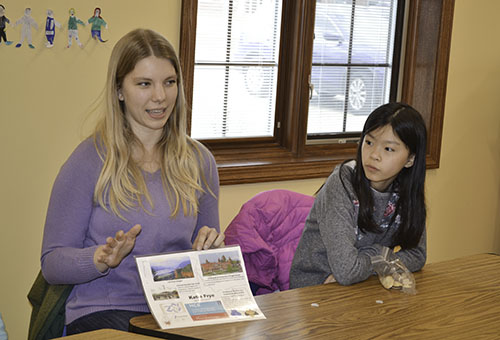
Katie Frye shares her personal history and how she ended up at Illinois.
So Frye hoped to “help other little ‘me’s’ that don’t know that science is an option and that there’s actually things you can do. Not just, “Oh, I like science; I’m going to do it in school,’ No, you can actually pursue it for your life.”
Like Kelliher, Frye also studies Staph aureus in Thomas Kehl-Fie’s lab.
Also underscoring the idea that there are lots of great career possibilities in science was PhD student Kristen Farley, also hoped to convey to the girls that if they like science, it would make a great career.
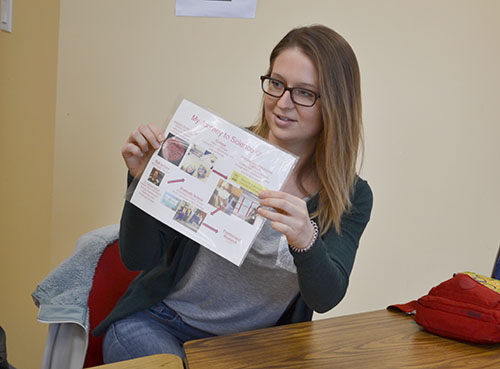
MCB PhD student Kristen Farley shares her personal path to science with the NGS students.
“I came for a lot of the same reasons that Katie came, says Farley. “When I was young, I was interested in science but I didn’t know that you could actually make it your career. I’d like to share that with these girls and give them a role model also.”
Farley’s research involves the study of a microbe that’s not a bacterium, but an Archean, a member of the third domain of life that was actually discovered here on campus by Carl Woese fairly recently. She adds that the microbe is completely anaerobic, which means it’s killed by oxygen and produces methane as a bi-product of its metabolism. She specifically studies microbes that live in the human gut, trying to develop genetic tools to study those organisms.
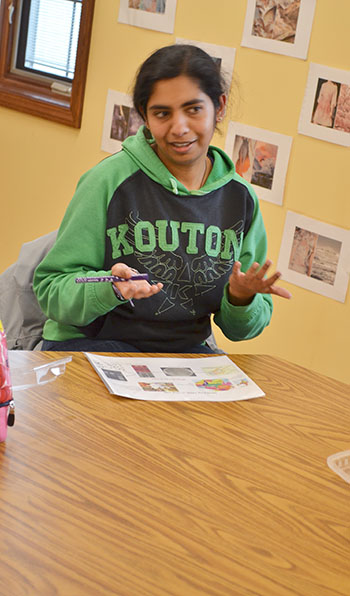
MCB PhD student Pritha Rao explains to the students about her current research.
Like Farley, Pritha Rao also hoped to influence some of the girls toward careers in research. And although she agrees it can make a great career, her main motivation was to recruit some additional help in the field solving some of the problems that need to be addressed. “I came today not only to be an inspiration to them, but to show them that there’s a career in science that they can do. There are a lot of unexplored questions out there that we still don’t know the answers to.”
While Rao wanted to be an inspiration to them, she also hoped that they might inspire her as well. “Because these are young girls,” she explains, “they haven’t explored anything, but they are full of energy to explore what is all there. Sometimes as we get older, I think we lose enthusiasm for everyday life. When we get into contact with the young girls, it brings back the enthusiasm. What we are doing is worthwhile, and it’s worth it to spread the message and encourage them.”
Rao, whose research is about how DNA is managed inside the cell, reports that if a cell’s DNA is not duplicated or repaired properly, there are little consequences. “So we are studying how these little consequences can be manipulated in terms of designing new drugs for curing cancer.
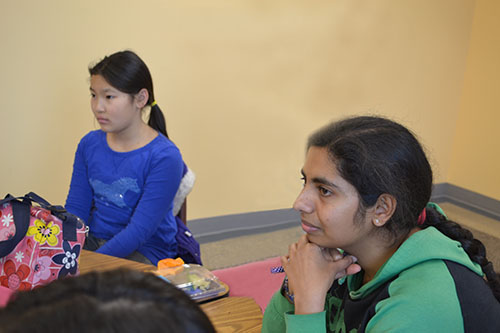
MCB PhD student Pritha Rao (right) listens as one of her follow grad students tells her story.
Like many of the other ladies, MCB PhD student Mara Livezey participated in the Café for many of the same reasons that these women already stated; she wanted to be a role model and encourage each youngster that a career in science is possible. But she had an even loftier hope—that maybe some of them might end up increasing the pool of female science faculty in higher education.
“There really aren’t that many female faculty,” she acknowledges, “…maybe because they never had women as scientific role models. I think something that’s really good is to expose young girls to, ‘Yes, you can be a scientist.’
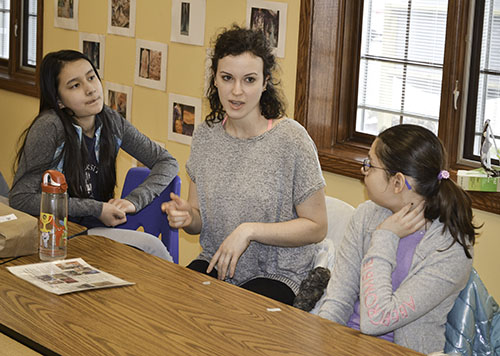
MCB PhD student Mara Livezey explains to the NGS students how she ended up as a grad student in MCB researching cancer.
So Livezey also hoped to sow the seed that another possible career they might aspire to is to become a faculty member. “This is something that women can do as well. So hopefully, over time, the percentage of faculty scientists who are women increases to become more equitable.”
Livezey believes that this shortage might be due to a lack of female role models. “I think some of the past, it wasn’t because there was some bias against women in science. It’s good just to have that strong female role model.”
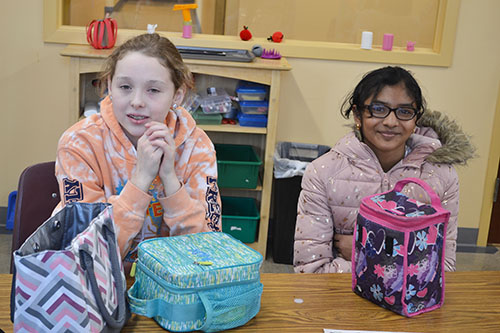
Two NGS students enjoy the Café.
Livezey, who researches breast cancer, indicates that in her lab, they do two different but related things. One is to study the pathway that protects cancer cells and helps them grow. “We want to understand how that works, how it helps them grow, and how it supports things that we already know about breast cancer.”
Her lab is also seeking to develop a drug that actually uses this same pathway, hijacking it and turning it way up to toxic levels in order to kill the cells that way. “My project is studying the drug and seeing how exactly it kills the cells,” she reports, “trying to understand this better and why it works so well.”
Story and photographs by: Elizabeth Innes, Communications Specialist, I-STEM Education Initiative
More: 6-8 Outreach, MCBees, Next Generation School, STEAM Studio, Women in STEM, 2018
For more I-STEM articles about STEAM Studio and Next Generation School, please see the following:
- STEAM Studio Uses Science, Technology, and Art to Go “Virtually Spelunking” in Caves—Exploring Everything From Spiders to Bats to 3D Cave Painting to GPS
- Wai-Tat Fu's Lab Partners with STEAM Studio To Make STEM, Spatial Reasoning Fun
- STEAM STudio's STEAMcation Students Visit RailTEC...Learn All About Trains
- Illinois' MCBees Expose STEAM Studio's STEAMcation Students to Medieval Science
- Next Gen's STEAM Studio: An After-School STEM Program With a Dab of Creativity
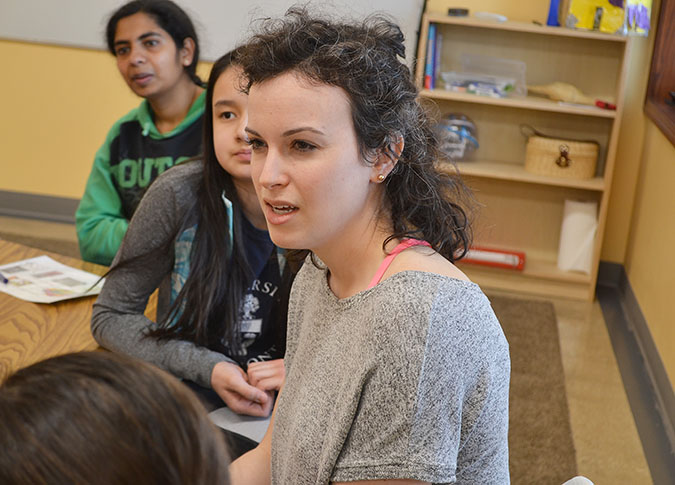
Mara Livezey interacts with the Science Social Café participants.